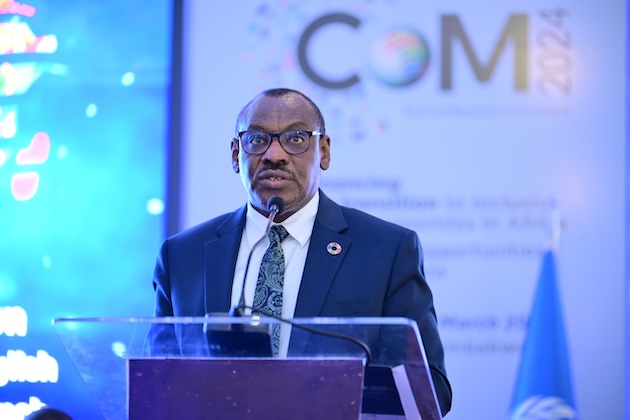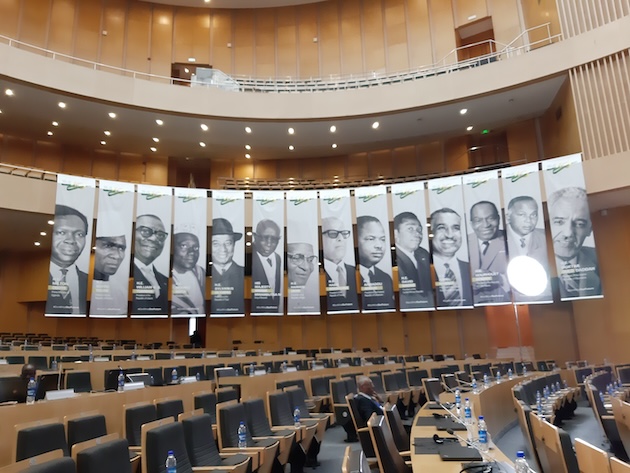ARTICLE AD
 Economic Commission for Africa’s Executive Secretary, Claver Gatete. Credit: ECAby Busani Bafana (victoria falls, zimbabwe)Monday, March 11, 2024Inter Press Service
Economic Commission for Africa’s Executive Secretary, Claver Gatete. Credit: ECAby Busani Bafana (victoria falls, zimbabwe)Monday, March 11, 2024Inter Press ServiceVICTORIA FALLS, Zimbabwe, Mar 11 (IPS) - With 20 percent of the global population and vast untapped natural resources, not forgetting its human capital, it is time Africa had its rightful seat at the global table, the United Nations Under Secretary and Executive Secretary of the Economic Commission for Africa (ECA), Claver Gatete, has called.
Decrying that Africa has been on the back foot on the global stage when key political and economic decisions are made, Gatete says it is time Africa claimed its voice. Gatete told a recent conference of African finance ministers in Victoria Falls, Zimbabwe, that Africa is in a financial and fiscal crisis because a global financial system does not have the interests of the continent at heart.
Africa Must Be Heard
“So, what will it take for African countries to really feel heard? Gatete asked.
“It is okay for us to say that 80 years ago, Africa was not at the table. It is probably acceptable to say that when the Millennium Development Goals were adopted, we were also at the periphery," he said, adding, “But we will not be forgiven today if we do not occupy center stage as architects of a new global financial architecture that works for us.”
Africa, he noted, was facing multiple crises that it was not directly responsible for but bore the worst impacts from the Ukraine-Russia war, COVID-19, and high indebtedness to climate change.
The financial difficulties that Africa is currently facing are not solely the result of COVID-19 or recent conflicts but also have their roots in an inadequate global financial architecture and a multilateral financial system that does not adequately serve Africa's needs, Gatete told IPS.
 The African Union is pushing for Africa to have a permanent seat in the UN Security Council. Credit: Busani Bafana/IPS
The African Union is pushing for Africa to have a permanent seat in the UN Security Council. Credit: Busani Bafana/IPSReferring to the creation of the UN in 1945, Gatate pointed out that the five permanent members of the Security Council—China, the United States, the United Kingdom, France, and Russia—made up almost 50 percent of the world’s population then, but today that figure is just 26 percent.
“While Africa now represents nearly 20 percent of the global population, it is not represented at the G7, whose proportion of the global population is only 9.7 percent. So how do you solve today’s problems with outdated 80-year old structures that do not reflect the global shifts that have occurred?"
Africa has long pushed for a seat on the UN Security Council, calling for the reform of the United Nations in line with the Ezulwini Consensus, agreed in 2022. The Ezulwini Consensus is a position on international relations and UN reform agreed upon by the African Union. Africa wants at least two permanent seats and five non-permanent Security Council seats chosen by the African Union.
Addressing the third summit of a group of developing countries (G77) in Uganda in January this year, UN Secretary General, Antonio Guterres said there is agreement for Africa’s representation on the Security Council.
“So for the first time, I'm hopeful that at least a partial reform of the UN Security Council could be possible for this flagrant injustice to be corrected and for Africa to have at least one permanent member in the Security Council,” Guterres said.
A Green Transition Good for Africa
Highlighting that a productive green finance system in Africa has the potential to generate USD 3 trillion by 2030, Gatete urged that Africa needs to move from ‘potential’ to tangible actions with bankable regional projects.
Innovative instruments like debt-for-nature swaps, regional blue bonds, natural capital accounting, and regional carbon markets can provide financing that addresses debt issues and fosters environmental action, he noted, emphasizing that Africa wants a fair price for carbon trading.
“It does not make sense for African countries to earn less than USD 10 per ton of carbon while countries in Europe earn over USD 100.”
A Call to Change the Global Financial Architecture
It is estimated that Africa spends nearly USD 100 billion on debt repayments annually, forcing many governments to defer investments in social spending on health, education, and food security.
ECA Deputy Executive Secretary and Chief Economist, Hanan Morsy, weighed in, saying there is a need to reduce the debt burden on African countries to enable them to allocate more resources to critical sectors like healthcare and education instead of high debt service costs.
“It is imperative to enhance Africa’s voice and representation, shifting from being rule takers to rule makers," said Morsy, adding, “This involves bolstering international cooperation on taxation and combating IFFs, including reducing tax evasion and profit shifting.”
Deputy Chairperson of the African Union Commission, Monique Nsanzabaganwa, said Africa’s potential to reclaim its long-overdue rightful treatment was materializing as the global landscape took multi-polar shapes and the African Union became a full member of the G20.
“Africa is stronger together," Nsanzabaganwa said, adding, “I will argue that the value proposition of the African Union is indeed to foster coherence in our strategies and amplify our common voice.”
IPS UN Bureau Report
Follow @IPSNewsUNBureau
Follow IPS News UN Bureau on Instagram
© Inter Press Service (2024) — All Rights ReservedOriginal source: Inter Press Service

 9 months ago
52
9 months ago
52 
